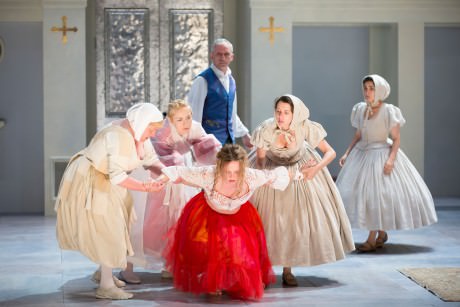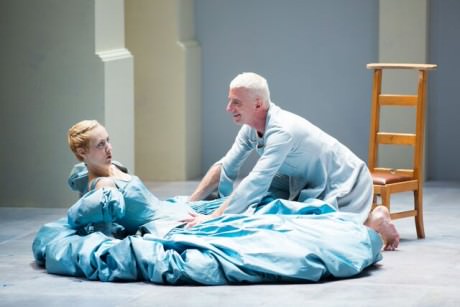“People do not mind being wicked,” said Moliere, “but they do object to being made ridiculous.” In Moliere’s great play Tartuffe, the merchant Orgon is made ridiculous by his overwhelming preoccupation with Tartuffe, a cunning religious fraud. A co-production with Berkeley Repertory Theatre and South Coast Repertory Theatre, now playing at Shakespeare Theatre Company, Tartuffe is a visionary 21st century re-imagination of Moliere’s classic comedy.

This Tartuffe offers startling insights into the geography of obsession, reminding us that there will always be people who believe in specious miracles, corrupt ministers and weapons of mass destruction that aren’t there. Still, the wealthy merchant, Orgon, who stands to lose his family, his home, his wealth, and his freedom, could be any one of us. “The world is full of fools, and he who would not wish to see one, must not only shut himself up alone, but must also break his looking-glass,” said Moliere’s friend, poet and critic Boileau.
Louis XIV found the first production, on 12 May 1664, “most amusing.” His mother, the devout Queen Anne, was shocked and horrified, and a row ensued between mother and son. The satire of religious hypocrisy was deeply disturbing to her, at a time when religious wars, then as now, cost many lives. Moliere struggled with the censors, and the play was actually banned for almost five years. It has since been recognized as one of his finest, if most controversial, works.
As the play opens, Madame Pernelle, Orgon’s mother (traditionally played by a man) is insulting the entire household, with the exception of Tartuffe, who in her eyes is a god in human form. The maid Dorine is too saucy; Orgon’s new wife, Elmire spends too much money on clothes; her grandson Damis is a fool; the reasonable Cleante, Orgon’s brother-in-law, is advised to keep his observations to himself and get out. Even the sweetly innocent daughter Mariane must, in Madame Pernelle’s view, have something to hide.
The visual beauty of the production strikes the eye immediately. It is late at night; some of the actors are carrying candles; the setting is an elegant home. It is not exactly the Paris of the Sun King; it is the 17th century, with echoes of 2015. Director and Co-Scenic Designer, Dominique Serrand, and Co-Scenic Designer Tom Buderwitz, have created a setting as opulent as Moliere’s poetry.
As Orgon, the role played by Moliere, Luverne Seifert has a perfect grasp of the character’s dilemma. It is hard not to have sympathy for him at times, in spite of the terrible things he does to his family. Full of indignation, his black pigtail flying behind him, he pillories anyone who dares to doubt the veracity of Tartuffe. It is a performance of depth and subtlety, with timing which feels almost musical.

Steven Epp’s Tartuffe is equally remarkable. He slithers on the floor like a snake, adopts what seem to be yoga poses, and eats an apple with an insinuating air as he attempts to seduce Elmire. In a way, his part is the most difficult, because although the play is a comedy there is certainly something sinister about him. His behavior to Orgon’s family is highly sexualized; the assault seems more like a rape than a burglary. He is associated with religious imagery; a giant cross; the practice of self-flagellation; and suspiciously impassioned prayer.
At first, it seems the sexuality of the character overshadows its other aspects. At times, I wondered if this was really Moliere’s point Isn’t Tartuffe a satire on religious fanaticism, rather than sexual obsession? However, as Tartuffe’s uncanny unpleasantness progressed, enhanced by the contrasting otherworldly music of “Kyrie Eleison,” I began to realize that this dark majesty was the essence of the director’s vision.
By the end, Tartuffe’s behavior illustrates the principle by which things which are over-emphasized tend to turn into their opposite. He becomes an almost Satanic figure. There are moments when he is truly terrifying. Here, Director Dominique Serrand illuminates uncomfortable truths which make the play relevant to our lives today.
Suzanne Warmanen’s Dorine is a sensation; full of life, energy, and wit. She has marvelous scenes with Orgon, as she climbs on a table to convince him that Tartuffe is a liar.
As Elmire, Sofia Jean Gomez, such a delightful Ariel in The Tempest, displays a different aspect of her gifts, as Elmire, the discreet and perceptive wife of a monomaniac.
Lenne Klingaman’s Mariane is appealingly high-spirited, adding much-needed color to a role which could easily come across as insipid.
Gregory Linington’s Cleante brings the power of politesse and reason to this topsy-turvy household. He gallantly offers Elmire his coat when she is left helplessly in her shift, and fights bravely for what he believes in, even as Tartuffe ignores or disparages his every sentence.
As Valere, Christopher Carley has a charming awkwardness which belies his underlying loyalty and resourcefulness. His quarrel and reconciliation with Marianne are stingingly accurate and very funny.
Brian Hostenske as Damis has the difficult task of being in a rage most of the time. He handles it with finesse, capturing the indignation of the angry young man with vigor and flair.
As Madame Pernelle, Michael Manuel is appealingly grumpy, and in this version the slap she usually gives to her maid Flipote is eliminated, along with the maid.
Laurent (Nathan Keepers) is extremely well played, and Michael Manuel does a hilarious turn as the Officer at the end of the play.
The Ensemble, Ross Destiche, Maria Leigh, Michael Litchfield, and Stephanie Schmalzle, are uniformly first-rate, switching focus when needed, and adding context to the almost balletic thrust of the action.

The Costumes, by Sonya Berlovitz, are especially inventive. The dresses which Elmire and Marianne wear; Damis’ flowery suit; the giant hat worn at the end by the agent of the king; all are visually exciting and expressive of character. They are impeccable, except for possibly the nipple-baring outfits of Tartuffe, which seem a bit extreme.
Lighting Designer Marcus Dilliard and Sound Designer Corinne Carrillo’s work is exceptional. The use of thunder, rain, bird song, and especially music is spectacular. It is as if one is standing before a striking portrait in the Portrait Gallery, when suddenly it comes alive.
The adaptation by David Ball serves the play extraordinarily well; he has retained the rhyme and added a contemporary touch that enhances the comedy.
As Adlai Stevenson said, “A hypocrite is the kind of politician who would cut down a tree, then climb on the stump and give a speech on conservation.” In skewering such hypocrisy, the great Moliere shows us why he is rightly viewed as the ‘Shakespeare of France.’
Director Dominique Serrand was called to the stage by his cast at the end of the evening. One can imagine no better tribute to the playwright or the production.
Running time: Two hours and 25 minutes, with one 15-minute intermission.
Tartuffe plays through July 5, 2015 at Shakespeare Theatre Company, performing at Sidney Harman Hall – 610 F Street NW in Washington, DC. For tickets, call the box office at (202) 547-1122, or purchase them online.






If this is the definition of a 21st Century reimagining I’m abandoning this century. I confess that I did not see the entire production. It was so grating that my date and I left halfway through, certain that nothing could redeem this production. If Moliere had written for Jim Carry, Adam Sandler, and Melissa McCarthy this would have been the result. Truly embarrassing production not in keeping with the STC’s high standards.